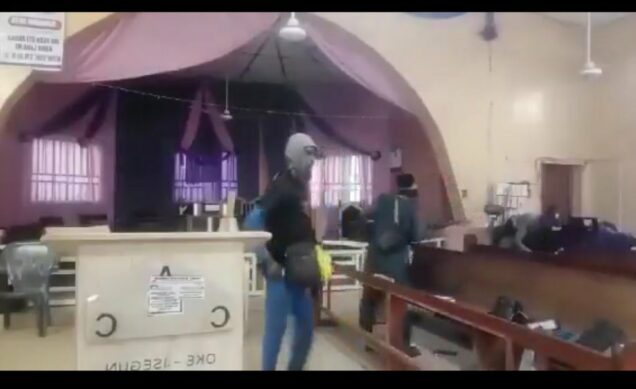
The evening of 18 November 2025 in Eruku, a border town in Kwara State, turned into a scene of horror when a branch of the Christ Apostolic Church (CAC) in Oke Isegun was violently attacked. What had begun as a routine service quickly descended into chaos: gunshots echoed through the sanctuary, worshippers scrambled in panic, and armed men stormed the church. The event stands as a grim reminder of the growing insecurity that continues to plague parts of Nigeria.
Eyewitnesses recall the terror as it unfolded. During a livestreamed service, more than five gunmen opened fire from outside the church. Congregants, including elderly women and children, rushed for cover. Some hid behind chairs, trembling, while others ran desperately for safety. Despite the efforts of the worshippers, the attackers forced their way inside, looting personal belongings and pushing people at gunpoint.

Tragically, at least three people lost their lives in the attack. The exact number of those abducted, including the pastor, remains uncertain, but reports indicate that a significant number of congregants were taken into the surrounding bush. Afterward, the assailants reportedly fled toward neighboring communities, leaving behind a shaken and grieving congregation.
The attack did not occur in isolation. That evening, heavily armed men advanced through the town’s access routes, firing sporadically and sending residents fleeing into the bush. Vehicles were abandoned in haste, and families were forced to leave their homes to escape the violence. Video footage that has since circulated online captures the full intensity of the terror: worshippers running for their lives, gunfire ringing in the background, and a community plunged into fear.
Reports suggest the attackers masked their identities, with some wearing masks and carrying flashlights. Local vigilante groups attempted to confront them, but the initial onslaught was overwhelming. Security forces, led by the Kwara State Police Command, eventually arrived and drove the attackers into the bush. However, there is confusion over casualty figures, with some reporting one death while others indicate three, fueling frustration among residents who feel their repeated calls for protection have not been adequately addressed.
This violent raid raises pressing questions about the nature of insecurity in Nigeria. While the assailants are often referred to as “bandits,” the coordination, planning, and choice of target suggest a level of organization that goes beyond random criminality. The fact that worshippers in a sacred space were attacked, killed, and abducted underscores the vulnerability of communities and the threat to the fundamental right to worship freely.
Eruku’s location near the border with Kogi State amplifies its exposure. The porous terrain makes it easier for armed groups to move undetected, posing significant challenges for security forces striving to maintain consistent protection. Residents’ calls for a stronger military presence reflect a deep sense of urgency: without decisive action, such attacks are likely to continue.
The psychological and social toll of this attack is profound. For the community, the church is more than a building—it is a sanctuary, a place of solace and spiritual refuge. Its violation shakes the very foundation of faith and trust. Families mourn their dead, and those who were abducted may carry lasting emotional scars, even if they are eventually freed.
The Eruku church attack is a heartbreaking illustration of how insecurity, when left unchecked, can penetrate the most sacred spaces. It demands more than condemnation; it calls for accountability, vigilant protection, and a renewed commitment to defending the basic rights of citizens to worship safely. For Eruku, and for communities across Nigeria facing similar threats, the hope for safety must now lie in sustained, decisive action from both local authorities and national leadership.